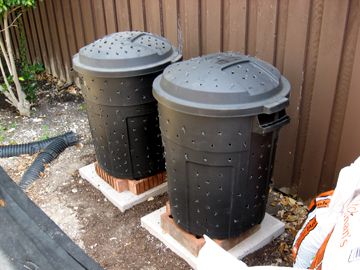Biodex Makes Composting Process Faster, Here’s How We Do It

Membuat kompos di rumah
(Istimewa)Compost is a type of organic fertilizer that has long been used in agriculture. It contains mineral nutrients that are essential for plants.
Citing the official website of Soil Research Institute for Agricultural Research and Development Agency of the Ministry of Agriculture, compost comprises organic materials such as leaves, straw, reeds, grasses, rice bran, corn stalks, tendrils, and animal wastes that have been subjected to decomposition process by decomposing microorganisms, so that they can be used to improve soil properties.
The remains of plants, animals, or animal wastes, and the remains of millions of small creatures such as bacteria, fungi, algae, unicellular or multicellular organisms are potential sources of organic matter for the soil, because of their vital role in improving the physical, chemical and biological properties of the soil. But if crop residues are not managed properly, they will bring a negative impact to the environment.
These organic materials will decompose when they are wet and damp, just like leaves when they fall to the ground and merge with the soil. During the process of change and decomposition of organic matter, nutrients will be free to form soluble and can be absorbed by plants. Before undergoing the process of change, the remains of animals and plants are not useful for plants, because the nutrients are still in a bound form that can’t be absorbed by plants.
Composting Process
In a natural open space, the composting process can occur by itself. Through natural processes, grass, foliage, animal waste, and other organic matter will decompose because of the cooperation between microorganisms and weather. This process can be accelerated with human intervention, by adding decomposing microorganisms so that a good quality compost can be obtained in a short time.
Organic materials that are generally used for composting come from agricultural wastes, such as plant waste and residues, livestock waste and residues, green manure, nitrogen fixers such as straw, rice husks, weeds, all vegetative parts of plants, animal solid feces, microorganisms and rhizobium.
Another organic matter that can be composted is cellulose. It has a cellular structure consisting mostly of lignin and cellulose which have a relatively low water content. Some of the examples are paper, sawdust, dry leaves, empty palm bunches, palm fronds and cocoa husks.
Organic wastes from agriculture or agro-industrial wastes such as cocoa pod husk, corn stalks or cobs, empty palm bunches if allowed to accumulate will pollute the environment and have a negative impact on health. They also may become hosts of pests and diseases in agricultural land. Composting is a solution for processing agricultural or agro-industrial wastes to be converted into products with economic value in the form of compost.
Benefit of Compost
Compost is very useful for improving soil structure by increasing the organic matter content of the soil and will increase the ability of the soil to retain soil water content.
Soil microbial activity that is beneficial to plants will also increase with the addition of compost. This microbial activity helps plants absorb nutrients from the soil. Soil microbial activity is also known to help plants deal with diseases.
Compost also has many benefits in terms of several aspects. Citing the Cybex.pertanian.go.id, here are the benefits of compost in terms of economic, environmental, and soil and plant aspects.
Economic Aspect
- Save costs on transportation and waste landfilling.
- Reduce the volume/size of waste.
- Has a higher selling value than the original material.
Environmental Aspect
- Reduce air pollution from waste burning and release of methane gas from decomposing organic waste due to methanogenic bacteria in landfills.
- Reduce the need for landfilling.
Soil and Plant Aspect
- Increase soil fertility.
- Improve soil structure and characteristics.
- Increase the water absorption capacity of the soil.
- Increase soil microbial activity.
- Improve the quality and quantity of crop yields.
- Provide hormones and vitamins for plants.
- Suppress the growth/attack of plant diseases.
- Increase the retention/availability of nutrients in the soil.
Biodex Speeds Up Composting Process
Pupuk Kalimantan Timur (PKT) as one of the largest fertilizer producers in Indonesia promotes the use of organic waste by producing a bioactivator product for composting called Biodex.
Biodex is a bioactivator to break down organic matter. Biodex is made using superior microbial active ingredients that have high cellulolytic and lignolytic abilities such as Trichoderma polysporum, T. viride, and Fomitopsis meliae, so that the composting period is relatively shorter.
Biodex is developed to overcome the problem of organic waste that contains high cellulose and lignin such as straw, husks, cocoa pods, sawdust, and empty palm bunches so that the decomposition process can run fast, save more time, effort and cost in composting.
Advantages of Biotex
Biodex has several advantages, it is suitable for solid organic waste, does not require additional nutrients, does not require a reversal during the composting process and is suitable for tropical areas. Its use can also make the composting process 2–3 weeks faster.
Besides that, Biodex is very easy to get in farm shops or online marketplace. It is sold in a 2,5 kg blackish brown powder pack.
How to Apply and the Dosage
In addition to the advantages mentioned above, the application of Biodex in the composting process is simple.
First, all organic material that will be used as compost is chopped first with a length of approximately 3 cm to get optimal results.
Then stack the chopped organic matter on a thin tarp. Each pile is flushed with water and sprinkled Biodex evenly. Do this until the organic matter runs out.
The dosage for soft organic matter is 5 kg/ton, while the dosage for hard matter is 10 kg/ton.
After that, cover with tarpaulin and wait for 15–30 days. Choose a shady place that is not exposed to direct sunlight. By using Biodex, you don’t have to reverse the organic matter during the composting process.
Written by: Renat
